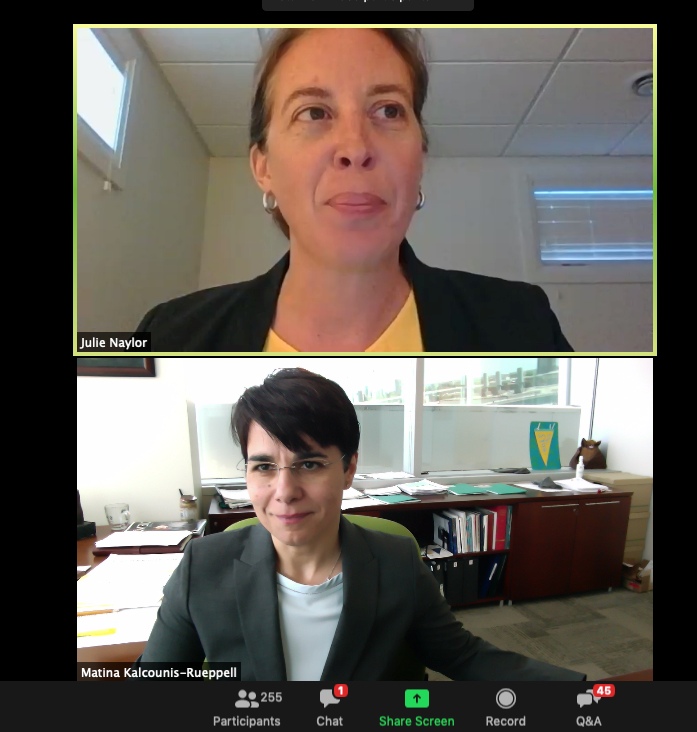
Assistant Dean (Programs & Operations) Julie Naylor (top) and Dean of Science Matina Kalcounis-Rueppell (bottom) hosting a webinar for parents of incoming first-year Faculty of Science students, sharing what to expect from the Fall 2020 semester.
“I do not underestimate the level of anxiety and concern you are feeling,” said Matina Kalcounis-Rueppell, Dean of the Faculty of Science and herself a parent of a postsecondary student, as she addressed 380 parents of incoming science students on a Zoom call this past weekend. Kalcounis-Rueppell emphasized that there is no question that should not be asked in advance of a fall term that will start like never before, with the majority of course delivery occurring primarily remotely.
“You are starting on a journey, and I cannot wait to welcome you to the Faculty of Science,” said Kalcounis-Rueppell to the incoming class. “We are always available to support you, no matter the circumstance. I honour that you have to do something different this fall. You will come out on the other side of your academic journey a scientist who will be set up to solve problems and change the world.”
Kalcounis-Rueppell made three commitments to students:
- Delivering courses remotely in a way that will not only meet course requirements but will also be an enriching educational experience
- Delivering courses face-to-face where possible, adjusting so that these exceptions can be delivered in small group settings to adhere to public health standards (an announcement of which courses will be considered exceptions is anticipated later in June)
- For students who cannot be on campus for any face-to-face exceptions—as a result of travel restrictions or health or family reasons—adjusting modes of delivery to ensure a quality learning experience, no matter the physical distance or time zone
Science courses—many with a strong focus on experiential learning through labs and field schools—require thoughtful consideration in terms of how to adapt. Beyond experiential learning plus lectures and seminars, there were many lessons learned in the emergency pivot to remote delivery in Winter 2020, which now inform the advance planning prior to the fall. Faculty of Science instructors are now hard at work innovating their courses in ways that will have benefits for Science students well beyond the remote delivery required during the COVID-19 pandemic.
Supporting students
“There is no decision made that doesn’t put students first, supporting students’ physical health and safety, and mental and emotional wellbeing,” emphasized Kalcounis-Rueppell.
The theme and focus on student support was a message echoed by Julie Naylor, Assistant Dean (Programs & Operations) in the Faculty of Science, who oversees a small but mighty team of student advisors who support more than 6000 undergraduate science students throughout their academic journey.
“COVID-19 or not, there are many supports in place for Science students,” said Naylor. “Please reach out and ask for help. The earlier we can help, the faster we can get you back on your path to success.”
Cultivating community
Beyond course considerations and student support, Kalcounis-Rueppell and Naylor spoke to the focus on building community in the absence of physical presence on campus. In addition to the numerous Science student groups, including Interdepartmental Science Student Society and the department student groups, the Faculty of Science supports a Science Mentor program, which pairs current Science students with incoming Science students to encourage peer-to-peer support throughout the academic journey. This is all on top of the plans that are being made by the departments in the Faculty of Science that will be an integral part of the learning community.
“Science and school is about more than just your classes,” said Kalcounis-Rueppell. “It’s the next phase of your life and the start of your career. It’s about getting to know your classmates and professors. It’s all about community. And though we might not all be face to face in person this fall, we are focusing on community in a different way, working to build remote communities for students until we can all be on campus together again.”
To all incoming and returning Faculty of Science students, we look forward to welcoming you back this fall. We will miss having everyone together on campus but will focus our energy and effort in ensuring that you all remain engaged as we learn together in this new and different learning approach.